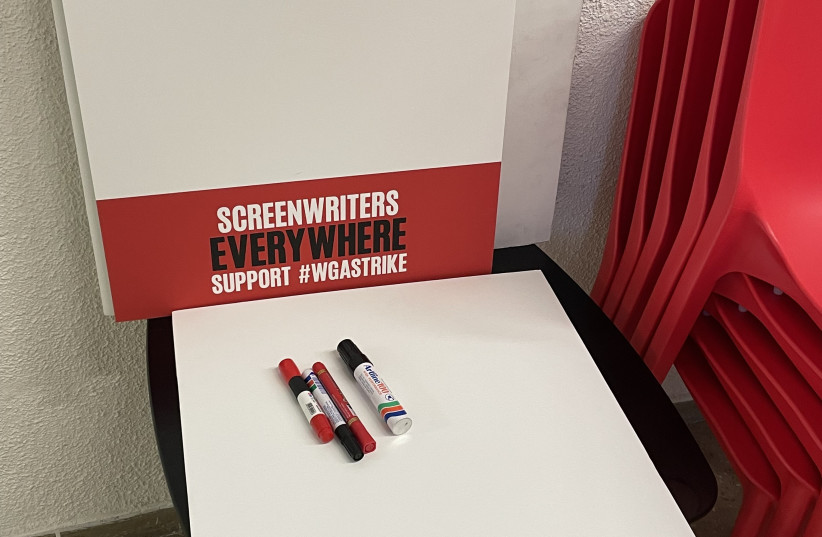The Screenwriters Guild of Israel (SGI) joined writers’ groups in more than 20 countries on Wednesday to support the Writers Guild of America (WGA) in an international day of solidarity that even included war-torn Ukraine.
“Our profession is under attack all over the world,” said Nadav Ben Simon, chairman of the SGI.
A strike by more than 11,000 US movie and television writers against major studios (like Disney) and streaming platforms (like Netflix), which are represented by the Alliance of Motion Picture and Television Producers (AMPTP), began on May 2.
About 16 SGI members and supporters came to Beit Elisheva in Tel Aviv for a presentation by Maor Gillerman and later took a group photo shared on social media with the hashtag #ScreenwritersEverywhere.
One of those attending the event was Erik Shapiro, a WGA member since the late 1990s who worked on programs like Cosby and made aliyah five years ago.

“Our profession is under attack all over the world.”
Nadav Ben Simon
SGI urges Israeli screenwriters: Back the WGA, don't be a scab for Hollywood studios
The SGI is urging its members not to cross the virtual picket line and “scab” for Hollywood studios. A handful of SGI members are also members of the WGA, and working for a struck company would bar a writer from future WGA membership.
Being a US screenwriter used to be a viable middle-class profession, with the average WGA member earning a bit more than a Starbucks manager annually. A few top showrunners, like Shonda Rhimes (Grey’s Anatomy, Bridgerton), have signed multi-year deals worth hundreds of millions of dollars.
However, screenwriting work has long been highly irregular, with about half of WGA members earning nothing from screenwriting each year.
Television writers are paid well by the week but may only work eight to 12 weeks on a streaming show (like Ted Lasso), compared to 18 to 22 weeks on a broadcast network show (like CSI).
Writers often rely on residual payments from re-runs, streaming, DVD sales, etc. to tide them over between jobs. However, streamers have been removing even popular shows from their platforms to get tax write-offs – and save on residuals.
The financial terms requested by the WGA would cost the AMPTP members $68 million per year – about 2% of their profits.
In contrast, eight major Hollywood studio CEOs were paid a combined $773 million in 2021.
The use of artificial intelligence (AI) is a hot topic in Hollywood, as elsewhere. The WGA proposed that AI can’t be used to write or rewrite movie scripts and that scripts written by WGA members can’t be used to train AI tools to write scripts. The AMPTP rejected this proposal and only offered annual meetings to further discuss the issue.
The Directors Guild (DGA) recently reached an agreement in principle with the AMPTP that included a provision that generative AI (like ChatGPT) can’t be used to perform the duties of DGA members, who have until June 23 to approve or reject the proposed deal.
The contract for SAG-AFTRA, which represents actors, expires on June 30. Members have authorized a strike if renewal negotiations are unsuccessful. The use of human performances to train AI-generated “actors” is among the issues at stake.
